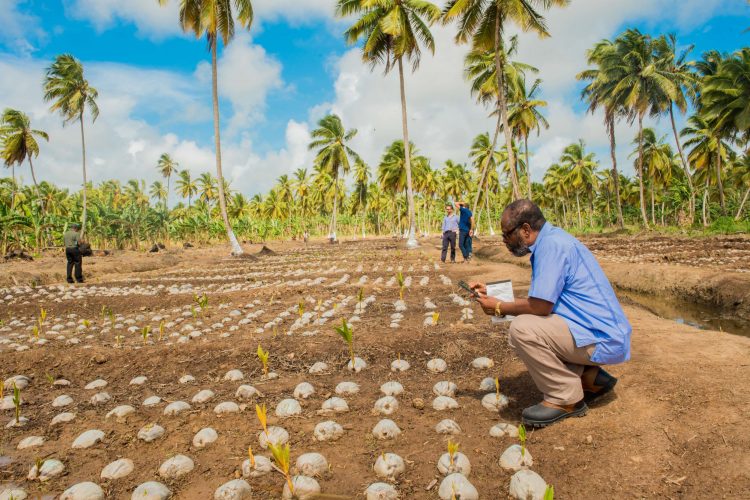It is more than a little comforting to know that the current elevated external international investor interest in Guyana does not begin and end with business initiatives that are, directly or indirectly, hinged to the country’s oil and gas sector. That, very much, still appears to have been the case since ExxonMobil, the lead company in Guyana’s ongoing oil hunt, announced that the move from discovery to recovery would be relatively short. Since then, several well-appointed foreign companies have arrived here seeking to secure their respective pieces of what is perceived to be one the world’s most enticing oil and gas ‘pies’.
Perusal of the portfolio on the Guyana Pomeroon Investments Inc. could well lead one to believe that the company intends to break that mould. No less significant, arguably, is what would appear to be its intention to challenge what had threatened to become an axiom, that is, that the country’s agricultural sector, which had, over time, become the anchor of its economy, might be swept away on a tsunami of ‘oil fever’.

Elsewhere in the local media, Pomeroon Investments Executive Chairman, an American Stanford University graduate named Duncan Turnbull, is quoted as saying that the company’s mission here is “to build a sustainable agriculture company vertically integrated and focused on exports, but with a strong social mission and respect for the natural environment.” It is difficult to set aside Turnbull’s stated intentions from the reality that the company arrived in Guyana having read the proverbial tea leaves in the matter of both the current condition of the global coconut industry and the direction in which it is headed.
Driven primarily by a growing preference for healthy food intake coupled with accelerating innovations in processing, the coconut market industry has grown enormously in recent years. The growing preference toward healthier dairy milk alternatives and naturalness is expected to increase the demand for coconut products even further in the period immediately ahead. Coconut water, has, as well, become the beverage of choice in the key United States market as well as here in the Caribbean.
Nor would the team at the helm of Pomeroon Investments Inc. be unaware of the fact that global coconut supplies have slipped well below expected production levels, with Asia, possessing around a 75% share in the global coconut industry, reportedly facing decreasing yields, the result, industry analysts say, of underinvestment and the loss of lands that have served historically as coconut groves being lost to urbanization and changing global weather patterns that undermine harvests. It is, to a large extent, the nexus between the decline in coconut production in Asia and the marketing-driven increase in demand for coconut water, particularly, that has made it arguably, the most sought-after beverage in both developed and developing countries.
While making no secret of its region-wide ambition insofar as investment in the coconut industry is concerned, the company’s current focus is on what Turnbull has described elsewhere as a “legacy estate” that once produced nuts for domestic consumption and which he said had already put a great deal of infrastructure in place. The overall operation sits on 1,300 acres of land in the Pomeroon.
The profile which the company appears to be seeking to sculpt for itself is encouraging. Integral to its profile is, it says, a long-haul commitment that envisages, among other things, a relationship with small farmers in the community and which embraces, among other things, a knowledge-transfer dimension as well as business relationships through which the company will engage some farmers with a view to purchasing seed nuts. Hopefully, the outcomes of these relationships will, among other things, help to haul the local coconut industry up by its frayed bootstraps.
To its credit the company also appears to have secured a considerable measure of success in building bridges with local and regional agencies involved in the advancement of the local agricultural sector including the National Agricultural Research & Extension Institute (NAREI) and the Caribbean Agricultural Research and Development Institute (CARDI).
Its key investment focus, however, appears to lie in the retail and extra-regional export possibilities that repose in what is sees as a huge potential US market and a smaller but nonetheless, strategically important regional market. Accordingly, the company’s primary focus is on the cultivation of the three-year dwarf variety for the purpose of producing coconut water. Their focus, however, goes beyond coconuts, extending into inter-cropping initiatives through which it expects to yield various fruit including passion fruit, bananas, turmeric and ginger. All of these possess potentially lucrative local and regional markets.
Arguably the company’s key selling point is what it says is its long-term ambition to be an integral part of a world class coconut industry. “We feel like we are doing our bit, to build the Guyanese coconut industry into something that rivals the Filipino coconut industry, the Brazilian coconut industry or the Mexican coconut industry,” Turnbull told the Stabroek Business during our virtual meeting earlier this week. If this is, indeed, one of its long-term ambitions then it would appear to have made an encouraging start.





